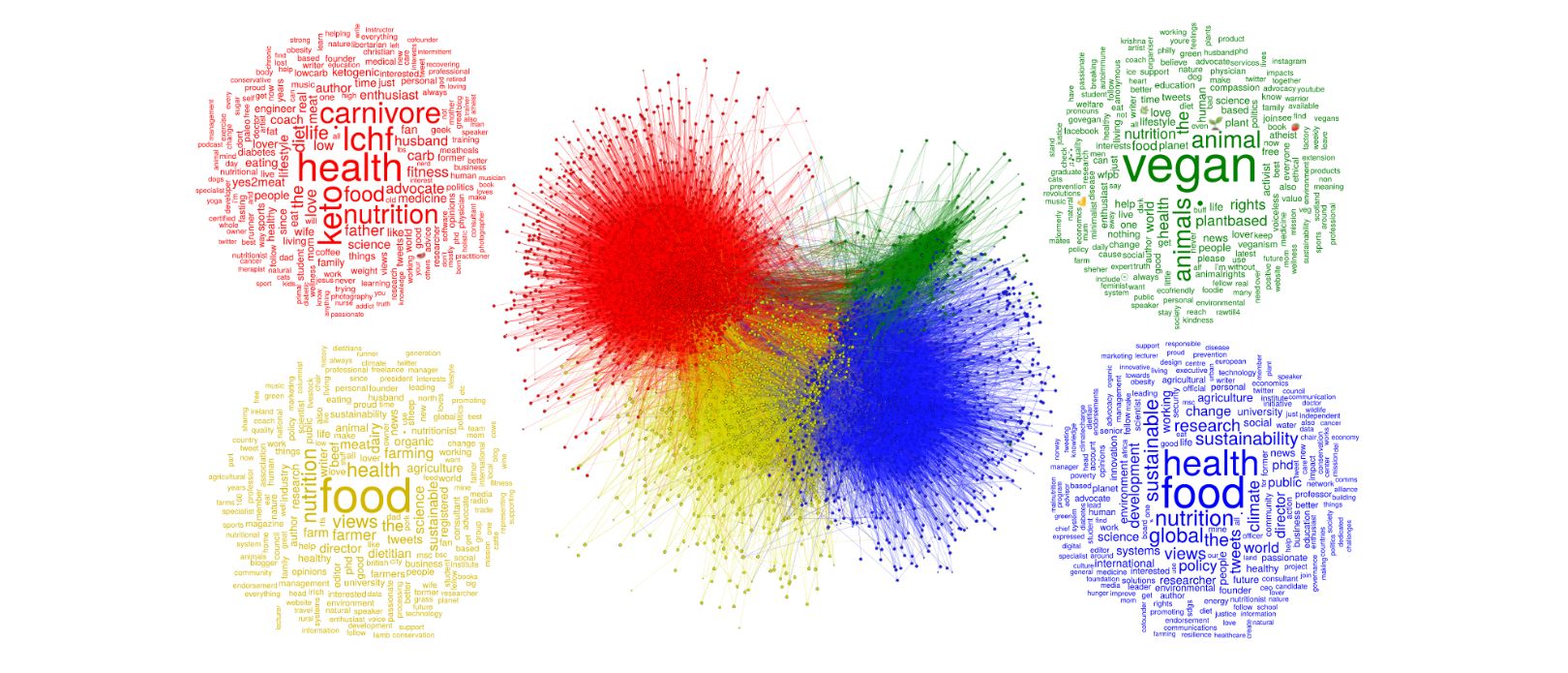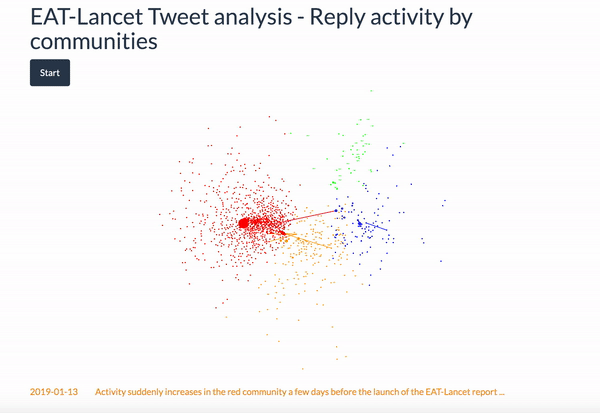Chapter 5
When health and climate misinformation overlap
Lead authors: Victor Galaz, Stockholm Resilience Centre, and Stefan Daume, Stockholm Resilience Centre

Social media community structures related to the planetary health and the social media campaign #yes2meat.
Health and climate are two topics that often are affected by mis- and disinformation. Where the two overlap, a perfect storm for false claims can grow. Experiences from the “digital backlash” that followed the launch of the “planetary health diet” can teach us important lessons about what happens when health and climate misinformation act in tandem.
Early in 2019, an international team of scientists published a groundbreaking study in The Lancet on how humanity can eat to both be healthy and live within planetary boundaries. One of the key take-aways of the paper was that eating less meat and dairy can improve human health and drastically reduce the ecological footprint of food production, at the same time.
The wider reception of the study was positive and its findings were covered in major news outlets around the world.
But on social media, a storm raged as the study was published. Under the hashtag #yes2meat, accounts gathered to circulate misinformation and defamatory material. A later analysis showed that this storm was a concerted effort of a pro-meat social media campaign that started its workings weeks before the study was released (Garcia et al., 2019).
The digital backlash created by the campaign continued over months and successfully swayed undecided users.
The majority of the accounts involved in the campaign were not driven by social bots, but by actual humans. On Twitter, these critics managed to reach 26 million people - compared to 25 million from academics and others that engaged in science communication. The campaigners achieved this, despite having much fewer followers, likely with the help of social media platforms’ amplification mechanisms (see chapter 3).

The video shows the number of replies over time in online discussions about the EAT-Lancet report. Red shows replies by users in the “yes2meat” community, blue is the “pro-EATLancet” community, yellow is an ambiguous community, and green is a vegan community. Based on “EAT-Lancet vs. yes2meat: Understanding the digital backlash to the ‘planetary health diet’”.
The #yes2meat backlash is just one example of how mis- and disinformation transgresses from one topic to the other. Such overlap is the rule rather than the exception. For example, climate denialism often overlaps with opposition to renewable energy projects (Winter et al., 2022), conspiracy theories around geoengineering (Debnath et al., 2023), xenophobia and false claims that link forest fires with Islamic terrorism (Daume et al., 2023). In some instances, climate misinformation drives waves of aggressive, sexist and toxic online comments (Park et al., 2021; Nogrady, 2021), often with their roots in far-right political environments (Vowles and Hultman, 2022).
As a reminder: the digital backlash following the launch of the “planetary health diet” unfolded in 2019. With the new powers of generative AI, it would be possible to amplify such campaigns in novel ways, contributing further to confusion and the erosion of trust in science.
References
Daume, S., Galaz, V., & Bjersér, P. (2023). Automated Framing of Climate Change? The Role of Social Bots in the Twitter Climate Change Discourse During the 2019/2020 Australia Bushfires. Social Media+ Society, 9(2), 20563051231168370.
Debnath, R., Reiner, D. M., Sovacool, B. K., Müller-Hansen, F., Repke, T., Alvarez, R. M., & Fitzgerald, S. D. (2023). Conspiracy spillovers and geoengineering. iScience, 26(3).
Garcia, D., Galaz, V., & Daume, S. (2019) EAT-Lancet vs #yes2meat: Understanding the digital backlash to the ‘planetary health diet’. The Lancet, 394(10215), 2153-2154.
Narayanan, A. (2023). Understanding social media recommendation algorithms. The Knight First Amendment Institute. Retrieved April 19, 2023, from https://knightcolumbia.org/content/understanding-soci al-media-recommendation-algorithms
Nogrady, B. (2021). 'I hope you die': how the COVID pandemic unleashed attacks on scientists. Nature, 598(7880), 250-253.
Park, C. S., Liu, Q., & Kaye, B. K. (2021). Analysis of ageism, sexism, and ableism in user comments on YouTube videos about climate activist Greta Thunberg. Social Media+ Society, 7(3), 20563051211036059.
Vowles, K., & Hultman, M. (2021). Dead white men vs. Greta Thunberg: Nationalism, misogyny, and climate change denial in Swedish far-right digital Media. Australian Feminist Studies, 36(110), 414-431.
Winter, K., Hornsey, M. J., Pummerer, L., & Sassenberg, K. (2022). Anticipating and defusing the role of conspiracy beliefs in shaping opposition to wind farms. Nature Energy, 1-8.
About the authors
Victor Galaz is an associate professor in political science at Stockholm Resilience Centre at Stockholm University. He is also programme director of the Beijer Institute’s Governance, Technology and Complexity programme. His research includes, among others, societal challenges created by technological change.
He is currently working on the book “Dark Machines” (for Routledge) about the impacts of artificial intelligence, digitalization and automation for the Biosphere.
Stefan Daume is a post-doctoral researcher at Stockholm Resilience Centre at Stockholm University. His research explores connections between digital technologies and sustainability, with particular focus on the promises and risks of social media for public engagement with environmental challenges.
Key terms
Are you unsure what a specific term means? Check our list of key terms.
Explore all chapters
Introduction: AI could create a perfect storm of climate misinformation
Chapter 1: What is climate mis- and disinformation, and why should we care?
Chapter 2: The neuroscience of false beliefs
Chapter 3: How algorithms diffuse and amplify misinformation
Chapter 4: Emotions and group dynamics around misinformation on social media
Chapter 5: When health and climate misinformation overlap
Chapter 6: A game changer for misinformation: The rise of generative AI
Chapter 7: Keeping up with a fast-moving digital environment






